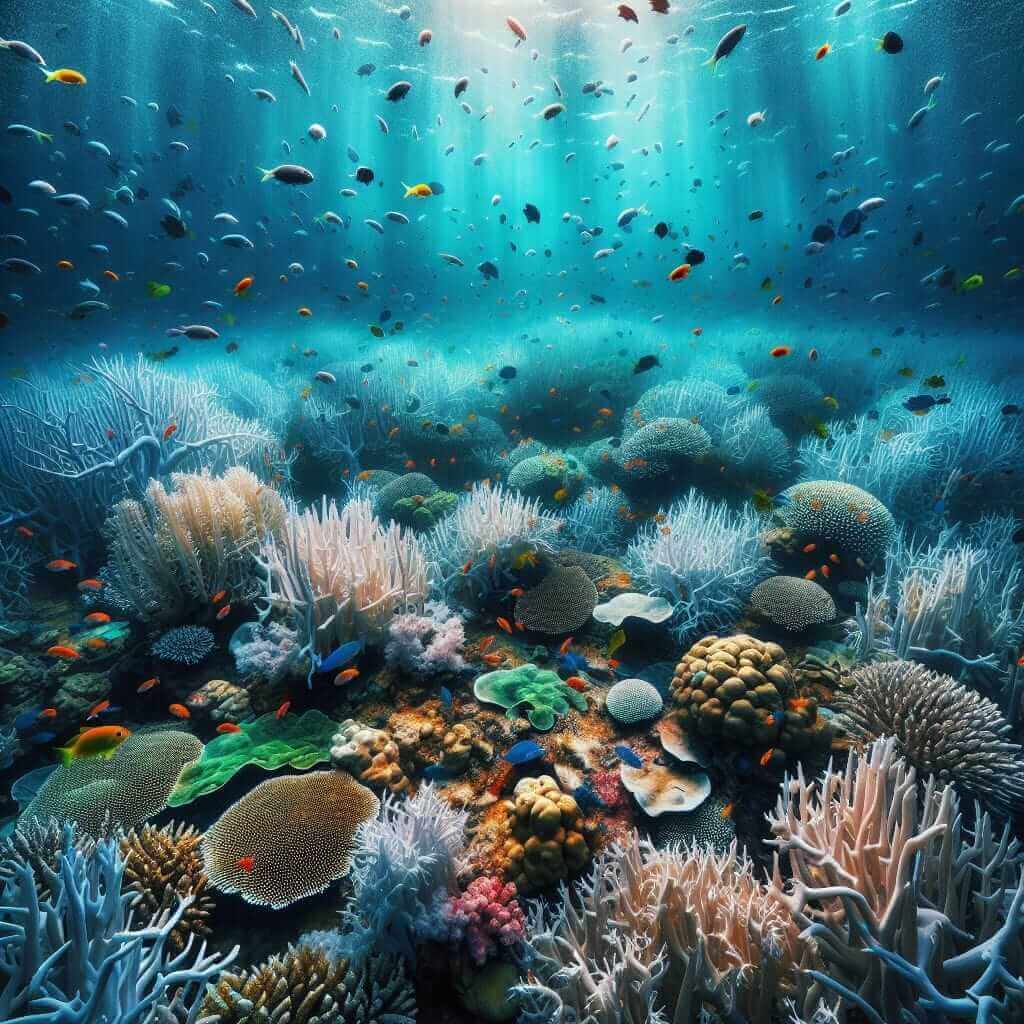Climate change is one of the most pressing issues of our time, affecting various facets of our environment, especially ocean ecosystems. In the IELTS Writing Task 2, the topic “The Impact of Climate Change on Ocean Ecosystems” is frequently encountered. This essay will explore key aspects of this issue and provide a detailed usage of related vocabulary and grammar.
Sample IELTS Writing Task 2 Prompts
- Task 2 Prompt 1: Many marine species are being threatened by climate change. Discuss the impact of climate change on ocean ecosystems and suggest possible solutions to mitigate these effects.
- Task 2 Prompt 2: The rising temperature of oceans poses a serious threat to marine biodiversity. Do you agree or disagree? Provide reasons for your answer.
- Task 2 Prompt 3: Examine how climate change affects the balance of ocean ecosystems and what steps can be taken to protect marine life.
Select a Prompt for Analysis
Let’s select the first prompt to create a sample essay:
Prompt: Many marine species are being threatened by climate change. Discuss the impact of climate change on ocean ecosystems and suggest possible solutions to mitigate these effects.
Analysis of the Prompt
The prompt asks to:
- Discuss the impact of climate change on ocean ecosystems.
- Suggest possible solutions to mitigate these effects.
Key elements:
- Impact of climate change.
- Ocean ecosystems.
- Possible solutions.
Sample Essay
Introduction
Climate change has emerged as a significant threat to marine ecosystems worldwide. The escalating temperatures and changing oceanic conditions due to climate change have had profound effects on species biodiversity and the overall health of ocean environments. This essay will delve into the impacts of climate change on ocean ecosystems and propose viable solutions to mitigate these adverse effects.
Body Paragraph 1: Impact on Ocean Ecosystems
Firstly, the increase in global temperatures has led to the phenomenon of coral bleaching. Corals, which are vital to marine biodiversity, depend on a symbiotic relationship with algae to obtain nutrients. When the ocean temperature rises, corals expel these algae, resulting in a loss of color and essential nutrients. Prolonged bleaching can lead to the death of coral reefs, which affects countless marine species dependent on them for shelter and sustenance.

Secondly, ocean acidification is another critical issue caused by climate change. As CO2 levels in the atmosphere rise, more of it dissolves into oceans, forming carbonic acid. This process lowers the pH of ocean water, making it more acidic. Acidic conditions are detrimental to calcifying organisms such as shellfish and some plankton species, which are crucial components of the marine food web.
Body Paragraph 2: Further Effects
Furthermore, changing ocean currents and melting polar ice caps influence fish migration patterns. Species that rely on specific temperature ranges are forced to migrate to cooler waters, disrupting local fishing industries and marine food chains. This shift not only impacts commercial fisheries but also alters the natural balance of ecosystems.
Lastly, the decrease in sea ice directly affects Arctic and Antarctic fauna, including polar bears, seals, and penguins, which depend on sea ice for hunting and breeding. The loss of these habitats triggers a cascading effect on the entire marine food web, leading to further instability in ocean ecosystems.
Solutions
To mitigate these effects, immediate actions are required. Implementing stricter regulations on carbon emissions can significantly reduce the greenhouse gases released into the atmosphere. Governments worldwide need to enforce policies that promote renewable energy sources and decrease reliance on fossil fuels.
Additionally, establishing more marine protected areas (MPAs) can help conserve critical habitats and allow ecosystems to recover from stress. MPAs provide safe zones where human activities are restricted, promoting biodiversity and resilience against climate change.
Moreover, public awareness and education campaigns are essential. Educating communities on the importance of sustainable practices, such as reducing plastic use and supporting eco-friendly products, can collectively make a substantial difference.
Conclusion
In conclusion, climate change poses a severe threat to ocean ecosystems, affecting coral reefs, marine species, and the overall health of the marine environment. Combating these effects requires a combination of stringent regulatory measures, the establishment of marine protected areas, and widespread public education campaigns. By adopting these solutions, we can safeguard our oceans for future generations.
Word Count: 401
Key Points for Writing
- Introduction must clearly state the topic and objective.
- Each body paragraph should focus on a single main idea.
- Use specific examples to illustrate points (e.g., coral bleaching, ocean acidification).
- Conclude with a summary and call to action.
Vocabulary Highlights
- Coral Bleaching (noun /ˈkɒrəl ˈbliːtʃɪŋ/): The loss of color in corals due to stress, often caused by increased water temperatures.
- Ocean Acidification (noun /ˈoʊʃən əˌsɪdɪfɪˈkeɪʃən/): The process by which the ocean becomes more acidic due to the absorption of carbon dioxide from the atmosphere.
- Symbiotic (adjective /ˌsɪmbaɪˈɒtɪk/): Involving interaction between two different organisms living in close physical association.
- Calcifying Organisms (noun /ˈkælsɪfaɪɪŋ ˈɔːrɡənɪzəmz/): Organisms that build shells or skeletons from calcium carbonate.
- Marine Protected Areas (MPAs) (noun /məˈriːn prəˈtɛktɪd ˈeərɪəz/): Regions of the ocean where human activity is restricted to protect the natural environment.
Conclusion
Climate change significantly impacts ocean ecosystems, causing coral bleaching, ocean acidification, and habitat loss. Addressing this issue requires a multifaceted approach including emission control, marine conservation, and public education. Future IELTS candidates should also explore related topics like overfishing, urbanization’s environmental impact, and biodiversity preservation to broaden their understanding and readiness for various prompts.